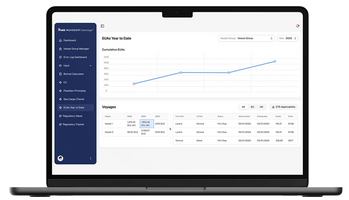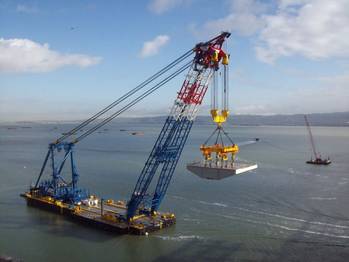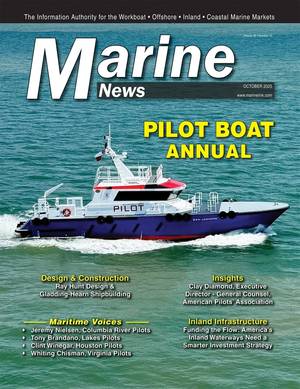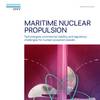The International Bunker Industry Association (IBIA) says proposed EU controls on marine fuels will hit shipping hard, with at least a $20 per
ton fuel premium in EU waters by 2005. It says shipping should act now to make credible alternative proposals for an emissions trading system, before the European Commission acts to tighten sulphur rules this summer.
At a recent meeting with the European Commission Directorate General, Environment, proposals were tabled for the control of air pollution from
ships. They propose a consultation period ending summer 2002, followed by legislative changes which will come into force by 2005. A cap on the fuel
sulphur levels for both locally trading vessels and also internationally trading vessels has been proposed as a straightforward method of reducing
sulphur (SOx) emissions from ships. There is no doubt that the proposals will have a very significant impact upon fuel costs for all types of ships arriving at or operating in Europe.
A meeting attended by IBIA was told that ships trading internationally will need to be operating on 1.5% sulfur fuel when passing thorough EU member state's territorial waters of the North Sea and Baltic. IBIA noted that this proposal is aligned with Marpol Annex VI provision for Sulphur Emission
Control Areas, (SECAs). More worrying to IBIA members and the shipping
community in general, is the purely regional requirement for international
ships to switch to 0.2% sulphur fuel once in port and when practical to do
so. A ship continuing on to another EU port, even if it is outside both
territorial waters and the sea areas of the Baltic and North Sea, would be
obliged to remain consuming 0.2% sulphur fuel throughout the voyage. A
voyage between Gothenburg and Belfast would fall within the intra EU trading
and require continuous use of 0.2% sulphur fuel.
Ferries have been identified as a special exception in the proposals for
intra EU trade, and are allowed to consume 1.5% sulphur fuel outside member
state harbour limits.
The IBIA representative, seeking clarification on the cap of 0.2% sulphur in
harbours was advised that ferries trading between Calais and Dover would
have the opportunity to switch to 1.5% sulphur fuel once the vessel had left
the harbour limits. But the vessel must be consuming 0.2% sulphur fuel upon
arrival at the destination harbour limits. It would be reasonable to
conclude that the Dover/Calais ferry route will in future be operating on
0.2% sulphur fuel.
The proposals do not draw a distinction between diesel and residual fuel.
The suggestion is that fuels would be designated "EU grades" and classified
by sulphur content. Expert advice to the Commission has suggested that
availability of 1.5% sulphur fuel should not present a problem. The
Commission was advised that any shortfall in 1.5% sulphur fuel could be
easily blended from residual fuel and lower sulphur diesel fuel. At around
$137/t for residual fuels (average sulphur content 2.5%) and $184/t for
diesel, (assuming sulphur content is 0.2%), a blended 1.5% sulphur fuel
would cost in the region of $157/t, around a $20/t premium over the regular
residual fuel price.
Ships needing a low sulphur fuel upon arrival will have to bunker 0.2%
sulphur EU grade fuel to avoid contravention of the 0.2% sulphur in harbour
limit. The words in the proposal are that ships can continue to use 1.5%
sulphur fuel "until practical to take on 0.2%". In 2008 the 0.2% sulphur EU
grade will become the 0.1% sulphur EU grade.
IBIA fully supports the principles of reducing the contributions shipping
makes to air emissions in areas where the density of shipping is having an
impact upon local communities. But there is no doubt that more than one
option exists for achieving emissions reductions. The Kyoto Protocol,
recognizing the need for flexibility of solutions, enshrines the use of
market mechanisms, the so called trading principles, as an acceptable method
to achieve promised reductions of CO2 gases. Similar trading schemes have
successfully reduced SOx and NOx emissions at lowest cost and often with
very immediate reductions in emissions.
IBIA is supporting BP Marine's initiatives to develop an emissions trading
model for shipping in the North Sea and Baltic. The European Commission
fully supports the emissions trading principles but report that it would not
fit with its legislative timetable. It is up to the shipping community to
demonstrate a credible alternative within the time constraints. The
Commission timetable is for proposals for legislation amending the Sulphur
in Liquid Fuels Directive by summer 2002 and entry into force from January
1, 2005. These changes will probably not need ministerial approval, so may
be brought in without consultation at national level.
Sponsored Content
Still trying to leverage digital in your operations? Create your own advantage

Pacific Titan Arrives on the U.S. West Coast — Redefining Heavy-Lift Capabilities

October 2025
 Read the Magazine
Read the Magazine

 Read the Magazine
Read the Magazine
This issue sponsored by:

Evolution of the Pilot Boat: From Wooden Schooners to High-Tech Launches
Subscribe for
Maritime Reporter E-News
Maritime Reporter E-News is the maritime industry's largest circulation and most authoritative ENews Service, delivered to your Email five times per week









